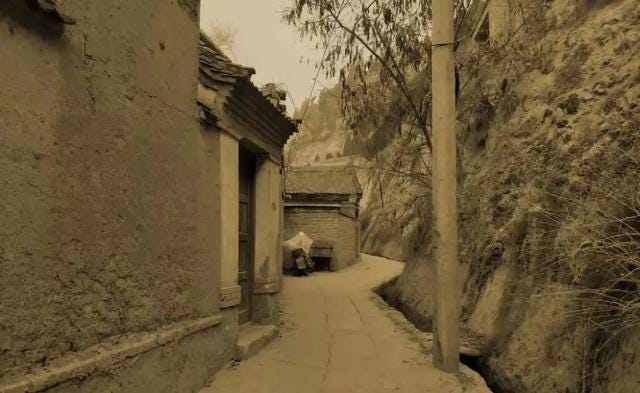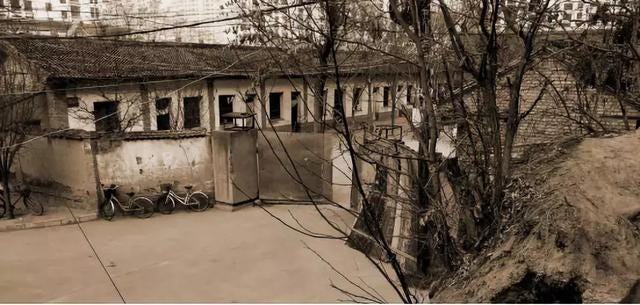
Hello from Chinarrrative and an advance happy Chinese New Year to all our readers!
On Dec. 18, China marked the 40th anniversary of a key policy meeting that laid the groundwork for its shift from a centrally planned economy to a market-driven one.
There has been no shortage of news specials and TV series that extol the country’s rapid ascent from economic backwater to global powerhouse in four short decades. In a recent piece, Truman Story offered a more personal perspective.
In a sweeping yet tightly written essay, author Qin Yong highlights China’s transformation—from southern Guangdong province’s headstart to hosting the Beijing Olympics to the more recent online shopping boom— by describing the fortunes of himself and two childhood friends.
Qin and company hail from a small northern city and more significantly, they were all born in 1978, the year that gave birth to the so-called “reform and opening up” project.
To make things more interesting, there’s a girl caught up in the mix.
New to Chinarrative? Subscribe here. Follow us on Facebook here. Past issues can be found here. Thoughts, story ideas? We can be reached at editors@chinarrative.com.
At 40, Three Pals Reunite in Hometown, Long for First Love

Qin Yong’s childhood home. Photo by author.
By Qin Yong
1.
In 1978, I was born in an “eight-family compound” in a small northern Chinese city. “Eight” is a figure of speech here. In reality, it was a cluster of crude homes. Four families lived in the compound. Each had an only child—in total, there were three boys and a girl, all about the same age. My three neighbors became my daily playmates.
Back then, most families were barely filling their stomachs. It was the beginning of China’s “reform and opening up” era of transitioning from a state-run economy to a market-based one. My father was on the road constantly. Apart from my mother, my closest companions were my neighbors Feng Bin, Pan Dong and Li Qian.
In 1987, the year I turned 9, much to our surprise, my father returned home with a Shanghai brand television set. TVs were still a luxury then. Few households in our township had one. It caused quite the stir in our compound for several days.
A TV adaptation of the classic Chinese novel Journey to the West was a big hit at the time. Our home was packed with visitors every night. Attendance was even higher during Chinese New Year. Neighbors hailing from blocks away crowded into our house to watch state broadcaster CCTV’s annual Spring Festival Gala.
Eventually our living room reached capacity. My father had no choice but to move our TV into the courtyard. A bonfire was started. The courtyard was soon bustling as people craned their necks for a better view. It was a livelier scene than a wedding.
Everyone sang along to a performance of A Winter’s Blazing Torch, the Chinese version of The Nolans’ hit song Sexy Music, completely oblivious to the freezing temperature. My three pals and I were glued to the TV.
After watching the latest episode of Journey to the West, we’d start acting out the main characters. I often played Sun Wukong, better known in the West as the Monkey King. Meanwhile, I’d paint a ring under Feng Bin’s nose to turn him into the anthropomorphic pig character Zhu Bajie, while adding a giant moustache to Pan Dong’s face, so he could play Sha Wujing, also known as Friar Sand. As for our female lead Li Qian, she could easily tackle the pale-skinned Buddhist monk Tang Sanzang with no makeup. We’d hold Li Qian’s hands gently while helping her onto the “horse”—the stand-in was a stool—that served as her trusty ride on her journey to India in search of Buddhist scriptures.
Eventually, us three boys would fight to play Li Qian’s husband, regardless of which show we were mimicking. It could be the hit animated series Calabash Brothers and we’d bicker over who would play the villain Scorpion Demon.
The four of us went to school together every morning and left school together in the afternoon, arms forever linked. Us three boys would save our pocket money, so we could buy Li Qian snacks, which spoiled her rotten. She swore she would never leave the three of us.
But things didn’t turn out as planned. Each one of our families eventually built new homes elsewhere. The four of us were separated.
But we were so accustomed to our friendship that we’d still try to get together every day, regardless of where we were. A day without seeing each other felt like an eternity. The pattern continued until the third year of junior high school, when our circumstances started to change.
Pan Dong and Feng Bin dropped out of school in close succession. Pan Dong joined the family fur business, while Feng Bin’s family moved to southern Guangdong province to join his uncle’s business.
People from our township flocked to coastal regions like Guangdong and Shenzhen those few years to become entrepreneurs. The richest residents of our township these days are all folks who ventured south back then.
2.
In 1997, Li Qian and I were scheduled to sit for our university entrance exams.
On July 1, Hong Kong returned to Chinese rule. Everyone was in a festive spirit that day. We nearly burst out in tears when we watched a People’s Liberation Army soldier address his British counterpart on TV, saying:
You are relieved from duty. We will take over.
That night, Li Qian’s father died in a car accident.
Li Qian’s parents always treated us as their own, so we were equally heartbroken. Feng Bin returned from Guangdong to attend the funeral.
After the funeral, Feng Bin stayed with me for a few days. Every day he would tell us stories about his family’s encounters in Guangdong. He kept marveling at how the coastal cities in the south were leaps and bounds ahead of the northern hinterland, saying:
They’ve already entered middle-class prosperity, complete with full-spectrum household electronics.
Feng Bin’s uncle, Feng Ze, had made a small fortune from his electronics business and was getting into real-estate development with a few friends. His success had far exceeded expectations. Feng Bin was completely full of himself, reeking of nouveau riche. I was completely uninterested.
But Feng Bin drew my ire by stating his romantic interest in Li Qian. Li Qian was getting prettier by the day, oozing the sex appeal of a young woman. She had plenty of suitors at school. I had had a crush on her for some time as well. I adamantly refused to ghostwrite a love letter for Feng Bin, which left him perplexed.
He had no choice but to pen the letter himself, which ended up being filled with errors. Word has it Li Qian rejected his advances outright. Feng Bin told me:
Wait until I make a name for myself. Let’s see if she rips my letter to shreds then.
Before he left, Feng Bin invited me to join him in Guangdong. He said opportunity was everywhere—you could turn a profit even by selling earth. I refused with a smile, saying that after careful consideration I still wanted to attend university.
I didn’t tell him the real reason: Li Qian was sitting for her college entrance exams too.
Yet on the first day of our exams, I waited until the final bell rang. Li Qian never showed.
3.

Former site of one Feng Bin’s factories in his hometown. Photo by author.
Luckily, I was accepted by a business college in the provincial capital. When I went home for Chinese New Year during my first year, Pan Dong told me he just got married. He was only 19. I complained about being left out of his wedding banquet. He responded: “No one was invited. Our two families just got together for a meal.”
I asked why he didn’t invite Li Qian, who was also living in the same county seat.
Pan Dong spilled the beans. He had also pursued Li Qian. Mother and daughter were going through a rough spell. The factory where Li Qian’s mother worked was transitioning from a state enterprise to a private one. She might be bought out. She didn’t know what to do next. Pan Dong wanted to marry Li Qian, but Li Qian refused, saying she could take care of herself.
Li Qian has ignored him since, Pan Dong said with a bitter laugh.
As the lunar calendar year drew to a close, Feng Bin also returned, triumphant. He entertained us with stories of his business exploits.
He had started out in Guangzhou, where he noticed the low price of electronics. Some manufacturers were selling VCD players at a wholesale price that was a tenth of the retail price in our township. Plus there was such a big surplus of VCDs they were being sold by the pound. So he started moving VCD players and VCDs.
He kept repeating that it was so easy to make money, and that he planned on taking a trip abroad after Chinese New Year. He said that he heard that clothing was very cheap overseas and that he had planned on earning some foreign currency.
Pan Dong and I were dismissive, calling him a bullshitter. Only when he pulled out his brick-like mobile phone and started making calls on it with a Hong Kong and Taiwanese accent were we impressed and gave him a thumbs up.
On TV, pop stars Na Ying and Faye Wong performed a rare duet on CCTV’s Spring Festival Gala, singing Date with 98.
That year was the last time Feng Bin, Pan Dong, Li Qian and I got together over Chinese New Year. We met up at Feng Bin’s place. It was mighty cold that year.
Li Qian was quiet. All she said when I asked how she was doing was that she was OK.
Meanwhile, Feng Bin couldn’t stop talking, constantly fantasizing about his business ambitions for the next 20 years. The rest of us couldn’t get a single word in. When it was time to leave, we still hadn’t found out much about Li Qian’s latest.
In 1998, southern China was ravaged by floods. Half of China was busy with rescue and salvage efforts. We were inundated with TV footage of PLA soldiers at the forefront of rescue operations. I wrote Feng Bin multiple times from school, but never heard back. Only later did I find out that he was in Japan.
Pan Dong wrote me saying that after Li Qian’s mother was laid off, mother and daughter moved to Beijing, where one of Li Qian’s uncles was working at the time. I wrote her many times. She never responded. We’ve never gotten back in touch since.
4.

A packed truck at Pan Dong’s lime factory. Photo by author.
When I graduated from university in 2001, I was assigned to a design institute in the provincial capital. By then Feng Bin already had his own factories.
He kept on trying to lure me to Guangdong, saying that one could make money whatever they did. These were prime years for starting your own business, he said. Forget about your pathetically paid lowly civil service post.
After weighing my options repeatedly, I quit my job two years later over my family’s objections. I joined a trading company, plunging head first into the wild tides of the world of commerce.
Just as Feng Bin had predicted, there were plenty of opportunities those few years. In 2003, China launched its first astronaut into space on the Shenzhou V vessel. It seemed as though every industry had hitched a ride on that very same rocket.
I was quickly promoted to operations manager at my company and earned my first big paycheck. I bought a flat in the provincial capital. Back then, each square meter of residential housing only cost some 2,000 yuan ($290).
In 2008, we turned 30. Feng Bin already owned a few factories, specializing in clothing exports. He even rented an abandoned school in our county and turned it into a branch factory by equipping it with the relevant machinery, professing a vision of prospering along with his fellow townsfolk.
He said he wanted everyone to get rich together. Manufacturing was a booming industry those few years. Feng Bin received orders from all over the country and even from foreign clients directly. His factories couldn’t meet the demand.
On May 12, the massive earthquake centered in Wenchuan in southwestern Sichuan province also affected my hometown. Feng Bin’s factory was located at the foot of a mountain, which stood precariously after the earthquake. The occasional dribbles of yellow earth along the mountain slope left Feng Bin sleepless. He decided to fly home and relocate the factory.
I happened to be taking time off so I could be with my pregnant wife ahead of the imminent birth of our child. Feng Bin, Pan Dong and I got together again.
By prevailing standards at the time, Feng Bin was a genuine tycoon. He seemed to have an infinite amount of wealth. I was doing OK too, having bought a flat and a car in the provincial capital. Only Pan Dong was struggling financially. We wanted to help, but he refused.
Pan Dong said there was bound to be a huge amount of reconstruction and new construction after the quake, so he wanted to get into the building materials business and become a lime supplier.
Pan Dong’s transformation was jaw-dropping. He insisted on watching CCTV’s evening newscast every day and formed his own views on economic development. He predicted the real-estate sector was due for a big expansion.
There was an influx of migrant workers in major cities that had become a permanent presence. They needed housing. Men and women who were born in the 1980s were reaching marriage age and those born in the 1990s would be getting married and buying property in a few years too. They needed housing.
So getting into the construction industry, selling construction materials was bound to make him a fortune, he figured.
Lo and behold, people soar when the timing is right and they are able to harness the winds. Pan Dong’s business thrived. The lime he produced quickly dominated the market. Apart from being procured by private developers, it was being used in public housing and government-built affordable housing as well. Trucks small and large came and went at his factory every day.
On Aug. 8, the Beijing Olympics kicked off. My child had just been born. Feng Bin and Pan Dong paid me a visit to offer their congratulations. Feng Bin kept lamenting the fact that if he didn’t have to come visit his newborn nephew, he’d be watching the Olympics live in Beijing. Who knows—he might even run into Bill Gates.
We had drinks over the live broadcast of the opening ceremony. By then, Pan Dong’s kid was already nearly 10, but Feng Bin was still single. We asked him why. He responded only with a smile.
He finally spilled his guts after we got him drunk. He was waiting for Li Qian. He figured that Li Qian refused his advances back then because he was nobody. But now he was wealthy and more mature. He felt he should be able to change Li Qian’s mind now.
To prove that he was serious, he showed us a photocopied document. It was a copy of a university diploma.
That year, the Chinese delegation won 48 gold medals, giving their compatriots plenty to brag about. Feng Bin said when he got back to Guangdong he was going to talk trash properly to his few foreign clients.
In 2008, the internet was also thriving in China. The number of internet users in China exceeded the online population in the U.S. I started my own blog, recording life’s ups and downs.
I also tried tracking down Li Qian through my blog directory. We had lost contact for nearly 10 years. I wondered how she was doing, wherever she was.
What I didn’t expect was that the internet boom would also affect my and Feng Bin’s career trajectories.
5.

Paradise Inn under construction. Photo by author.
The global financial crisis started hitting China hard in 2008. The number of orders Feng Bin’s factories received began to decline. I suggested he diversify his production lines, but he ignored my advice.
In 2012, despite internet rumors of a doomsday scenario, total sales for e-commerce giant Alibaba’s “Double 11” “shopping festival” on Nov. 11 still hit 19.1 billion yuan ($2.8 billion).
Only then did Feng Bin comes to terms with the power of the internet, but it was already too late. In the end, he was forced to close his three factories in our hometown.
As for me, I was constantly on the road, flying from city to city chasing orders and meeting clients. All my passion had been buried by anxiety and pressure. Only Pan Dong, who held fort in our hometown, enjoyed some measure of stability.
There was still no word from Li Qian.
After clinging on for a few years, we finally made it to 2018. We turned 40 and it was time for another World Cup.
I set up a WeChat group that included Feng Bin and Pan Dong, so we could properly enjoy the World Cup. We held a videoconference every night, shooting the breeze and watching matches together at the same time.
Feng Bin went through some major ups and downs these past few years. He was forced to shut several businesses, enduring a midlife crisis that took on dramatic dimensions.
Meanwhile, my company was struggling too. Even though senior management implemented several rounds of sweeping reforms, our prospects didn’t improve much. I spent every day in anxiety and my hairline kept receding. Moving back to our hometown became a lifeline that kept lurking at the back of my head.
Pan Dong’s business wasn’t affected by the global financial crisis. His midlife crisis revolved around family. He had neglected his family while focusing on building his business in recent years. He and his wife had grown apart and his son’s grades were becoming progressively worse. He too felt adrift at age 40.
I announced to Feng Bin and Pan Dong that we had to save ourselves. We were still young. We couldn’t give up just yet.
Browsing the headlines on my phone one day I stumbled upon a story about how bed and breakfasts were popping up at scenic locations across the country. Home owners were converting their houses into family-style inns that served as a getaway and pressure valve for urban dwellers.
The hotel owners spent their days drinking tea, chatting with guests and enjoying life in general, while making easy money at the same time. Wasn’t this exactly the kind of lifestyle I wanted?
My old home in the “eight-family compound” was located near a tourist spot. I could stop leasing it, plant a few peach trees outside and turn it into “Paradise Inn.” I called a videoconference immediately to share the idea with Pan Dong and Feng Bin. They were on board right away.
Pan Dong offered to fund the venture and Feng Bin said he’d fly back right away to conduct market research.
Thanks to remnants of the real-estate boom, I was able to sell my apartment in the provincial capital quickly. It went for 10 times the price I bought it for. The hike in housing prices over the past decade has been simply incredible.
It dawned on us the day construction began for the inn that we were back at square one, after all our travels and trials over the past 20 years. The only missing piece was our female lead, Li Qian.
Memories flashed in our heads as we watched bulldozers tear down old houses in the compound. We pondered everything that we had gone through. It was as if we had just woken up from a very, very long dream.
These days we meet in our old courtyard every day to go over our business plan. Maybe Li Qian will show up one day. Maybe not. Either way, our new golden years are about to begin, right here.
Translator: Min Lee


